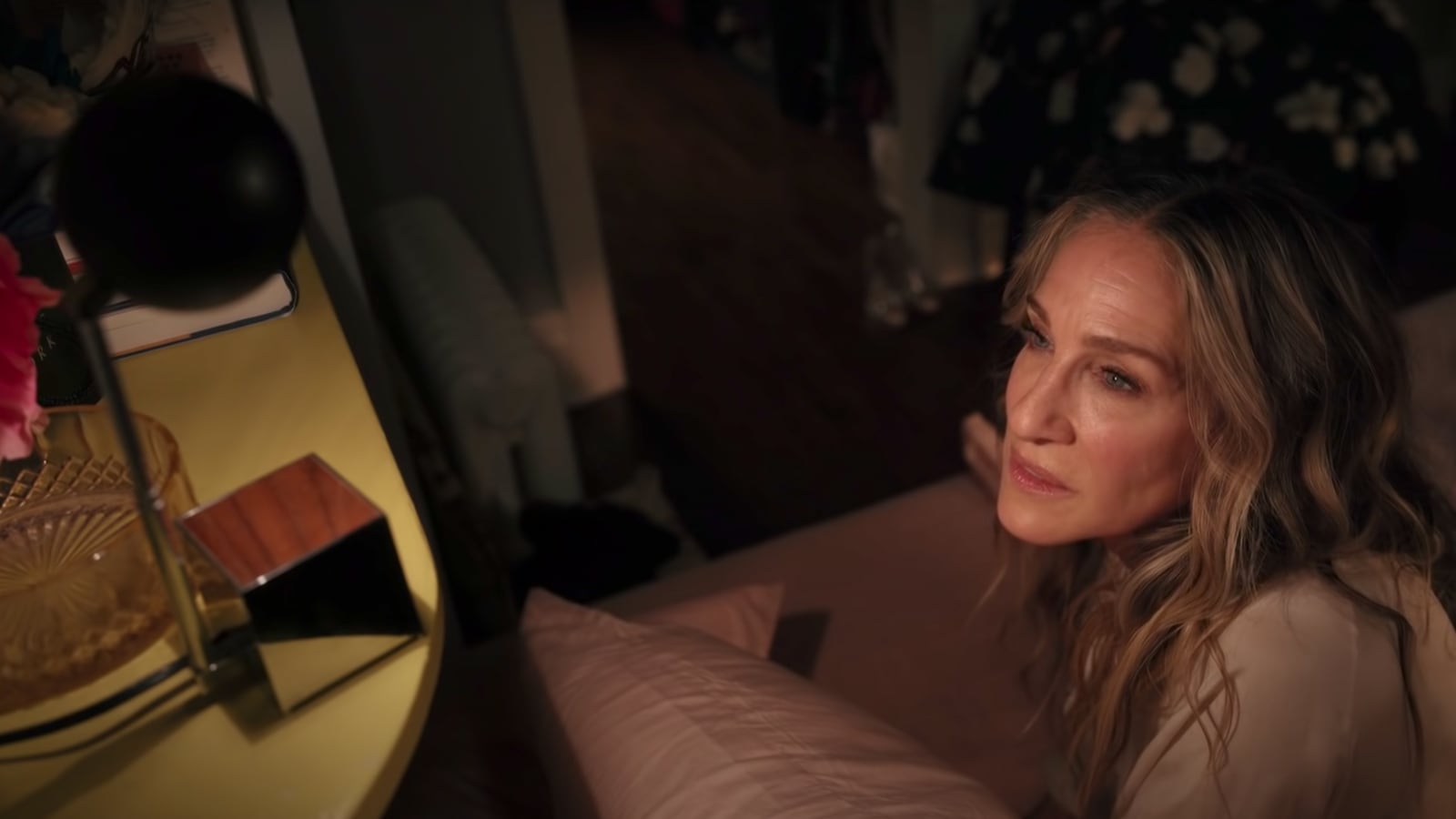It is my firm belief that we will unravel as a society now that And Just Like That... has stopped airing.
In these fractured, violently divisive times, we have been united by one thing: our concern for what this Sex and the City sequel was doing to Miranda Hobbes.
We’ve been delicately tethered by a single thread—that of our collective flabbergastation over the character of Che Diaz.
As a nation today, in a rare and beautiful moment that could prove to be historic, we do agree: Sarah Jessica Parker’s performance is as charismatic and magnetic as it’s ever been—a singular gift to television—and the elegant handling of Carrie Bradshaw’s story arc this season has been And Just Like That…’s beautiful saving grace.
HBO Max’s gambit on following Carrie and her girlfriends as women in their fifties—controversially but unavoidably without Kim Cattrall’s Samantha—has turned the water cooler into a flaming bonfire of discourse. Extreme opinions about the show and its characters have been preached with the ferocious conviction of a radical at a pulpit. Sex and the City is a religion, and anything that goes against the Word of God—cherished memories of Carrie’s puns—is akin to sacrilege.
But that’s been the somewhat surprising revelation of these last weeks spent watching and debating And Just Like That… It’s a weekly gathering akin to church. For as much backlash as there was to some of the early episodes, and certainly to some specific character additions and plot decisions (why you gotta do my man Steve like that?), everyone watched it.
Each week we gathered. We bore witness. We communed. We complained.
Maybe there were some (many) among us who, perhaps like church, viewed it as an obligation—the spiritual version of a “hate-watch.” But then, as we considered the gospel we just heard and worked through our feelings about it with our friends (and the internet), we experienced something. I couldn’t help but wonder… was it enlightenment?
We were all gabbing passionately about the same thing, albeit not always in a positive manner. Still, how nice has it been to have something to bond over besides the cumulonimbus of doom and despair that has cast its shadow over our entire existence? How nice has it been to spend time with these characters, revisit memories of old episodes, and all be, as I have every day for the last 20 years, talking about nothing besides Sex and the City again?
If nothing else, Miranda got fingerbanged in the kitchen while Carrie peed in a bottle, and we all lived through it. We survived the trauma, and we survived it together. We are forever connected.
I’ve been more of an apologist of And Just Like That... than some critics, and certainly more than some SATC fans. With that caveat, I did think the finale that premiered Thursday was quite lovely. Taken as a whole project, the entire series was certainly fascinating… but also wonderful. If nothing else, it was illuminating when it comes to how we process rose-colored nostalgia when it confronts harsh present-day realities, especially concerning women and aging.
Warning: Spoilers follow for the finale of And Just Like That…
I think in order to appreciate And Just Like That…, a Sex and the City fan needed to make peace with the fact that it was the same, but different. As much the same and yet as drastically different as can be true for something like this, a continuation of a franchise after an 11-year hiatus.
Like any living, breathing thing you see for the first time after more than a decade has passed, it would feel as familiar as it’s always been—yet entirely unrecognizable. The reunion would be messy. Figuring out the new relationship and new dynamic, in this case between SATC stalwarts and the creative intentions of this new series, would be a painful, difficult process—but, in the end, hopefully a rewarding one.
There was so much advanced hysteria about the launch of And Just Like That... itself—whether or not it should exist without Samantha, how it handled her absence, how the new diverse characters fit in, Big’s death, the Peloton of it all—that it drowned out most consideration of what it actually meant to follow this story into 2022 with the women in their fifties, and lend that narrative dignity.
Much of the camp was replaced by a certain gravitas, which, while jarring at first, now after 10 episodes feels appropriate. It tackled grief, the way friendships change, the way our own identities evolve—sometimes fundamentally—and how getting older is liberating, mortifying, frightening, and a joy, often all at once. The brunch conversations are different, because the time in their lives where we’re meeting these women is different.
There were times when it felt like classic Sex and the City. Carrie’s stalking of Natasha (Bridget Moynahan) and her disastrous first post-Big date, coupled with the humiliation of the school auction, served up classic SJP charm mixed with comedy hijinks grounded in profound emotional truth.
There were times watching felt like torture. The cringe and second-hand embarrassment was almost too much to handle, especially when it came to all things classified under “podcast,” “comedy concert,” the phrase “I do a lot of weed,” and the nickname “Rambo”—a word that, each time it was uttered, stole a tiny piece of my soul (a piece I’ll never get back).
I understand why people were annoyed that Miranda, our intelligent, progressive, always-rational hero, suddenly became a sparking-powder-keg version of The Older White Woman Constantly Saying the Wrong Thing. To them, it was character assassination. But there’s something to be said about the idea that these women, once the It Girls and provocateurs, were now paying catch-up to a new generation and wouldn’t always get it right. Miranda is someone who would be so paranoid and insistent on being overly woke that her eagerness would have her tripping over cultural landmines.
You can’t talk about Miranda without talking about the Che of it all. There’s not much more to say about Che that hasn’t already been said. Frankly, a lot of people, us included, sometimes wished we could lift this entire plotline out of the show. It was that hard to watch. But there’s something to appreciate, those irritations aside, about the evolution of Miranda. She spent the first 13 years we knew her being pragmatic, including when it came to love. Now she’s seeking out desire, embracing spontaneity, and being driven by passion—even if it was at the expense of our beloved Steve’s happiness.
We watched her chase after Che to Cleveland like we were watching a horror film. But how cynical are all of us that we assumed her BRE (Big Rom-Com Energy) would blow up in her face, with Che rejecting her grand gesture and leaving Ms. Hobbes heartbroken?
In the finale, she makes the decision to follow Che again—this time to California, where they are shooting a pilot. Thanks to some great writing and a scene with her and Carrie that echoed the iconic “I think you’re making a mistake” sidewalk confrontation in the original series, we have the same epiphany that Carrie and Charlotte do: Miranda is in love and that’s something to celebrate and change your life for, even if you don’t quite understand it.

Che (Sara Ramirez) and Miranda (Cynthia Nixon) in And Just Like That...
HBO MaxThe finale also put effective punctuation on the sly changes in Kristin Davis’ Charlotte, who is the character who seems to have made it through And Just Like That… the most unscathed. (And that’s even with a scene in which she’s walked-in on by her daughter as she’s about to fellate her husband.)
The Charlotte we knew and loved is a woman who cared deeply about appearances and propriety to the point that she could often seem rigid or close-minded. Those preoccupations are still there, but now they present through the prism of a wife and mother who cares just as fiercely about what those things mean in terms of her children’s happiness.
When her child begins to identify as non-binary, she takes a beat to process it before charging into acceptance with an open-mindedness and open-heartedness that she takes as seriously as any of her earlier, more superficial endeavors. (A “they-mitzvah” is a very corny, very Charlotte thing to do.)
What was touching in the finale wasn’t just to see that Charlotte would cave and be alright with her child refusing to take part in the mitzvah ceremony. It’s that she stepped in and was bat mitzvahed instead. The symbolism was on-the-nose, but still sweet: She was a “woman now,” ha ha ha, but truly—and finally—the best version of herself, the one she had worked so hard and deserves to be. And she achieved that by bending expectations and her own rules.
The amount of appreciation in this piece is definitely excessive, but the truth is that there are different kinds of fans. Some are extremely protective and are affronted when things don’t play out in the way they’d envisioned. Others are so delighted by the thing they love that they’re grateful to spend any time in that universe. They will seek out the good, overly apologize for and excuse the bad, and perhaps be slightly delusional about its quality.
Hi, it’s me. I’m the latter.
So with that mindset, we single out Carrie’s arc as the most considered, genuinely gratifying result of the big “Sex and the City sequel” experiment.
Charting her growth this season through the lenses of grief, mourning and rebuilding was a strong choice. It’s not that anyone sadistically wanted to see the character suffer heartbreak and immense pain. But her journey through that—learning who she is alone, understanding how she can still channel and connect with Big after death, figuring out what it means to be vulnerable and joyous and a good friend again—grounded and centered the extremity and, often, lunacy of the other storylines and issues that surrounded it.
Because this is Sarah Jessica Parker in the role, there was still an abundance of goofy, uninhibited comedy, but also a copious amount of grace through what could have been a tricky and polarizing creative choice: “You’re killing off Mr. Big??? The Carrie Bradshaw happily ever after???” It also gave space to make what could easily have been And Just Like That…’s most problematic and angering plot point—the writing off of Samantha—something not just believable and relatable, but, in the end, quite tender, too.

Carrie (Sarah Jessica Parker) and Seema (Sarita Choudhury) in And Just Like That...
HBO MaxIt was so smart not to be cruel in the handling of Kim Cattrall’s departure from the franchise. I know a lot of people had a hard time fathoming that Samantha would just ghost her friends, but for others, that falling out of touch with even someone so close was relatable and real. I’m glad it wasn’t just hurriedly taken care of in the first episode and never addressed again. Her absence was revisited in natural ways, and the impetus for reconnection—Big’s tragic death—rang, unfortunately, true to life as well.
Watching Carrie text with Samantha in the finale, with that tease of reconciliation, was just as emotionally resonant to me as seeing her spread Big’s ashes. The series ended up navigating what could have been its two most precarious storylines impressively.
I hope there’s a season 2. With the exception of Sarita Choudhury’s Seema, the new characters seemed too haphazardly shoehorned into the framework of the series and were never fleshed out enough to truly invest in. I’d like more time to explore their lives. And given the intensity of the discourse surrounding this season—and how judgmental and, frankly, ageist and sexist it was—I’m intrigued by the idea of creative retribution: how a season of the show in response to that feedback might play out.
But mostly, and especially after that invigorating final scene in the elevator, I want to revisit Carrie again. This entire season, it’s annoyed me that the title And Just Like That… has an ellipsis at the end. (Mostly it’s just a pain to keep writing.) But now I embrace it. The story must continue.







